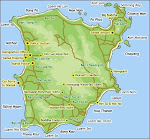
Orchids belong to the most diverse family of flowering plants known to man. There are over 28,000 species and well over 300,000 registered cultivars currently documented. The number of orchid species equals about four times the number of mammal species or more than twice the number of bird species. It also encompasses about 6–11% of all seed plants. About 800 new orchid species are added each year.
These numbers only begin to tell the true story behind the evolutionary success of modern day orchids. Orchids are the most rapidly (genetically) changing group of plants on earth and more new species have been discovered over the last few thousand years than any other plant group known.
Although orchids are commonly thought of as tropical flowers, they grow naturally in almost all climates other than deserts and glaciers. Despite their versatility, there is something distinctly exotic about orchids. They are intricately beautiful to the everyday flower lover and are considered to be some of the world’s most evolved flowers to flower specialists. Of the many orchid varieties, the Phalaenopsis (or Moth), Cymbidium, and Dendrobium orchids are the most popular types, and the Vanilla Orchid (and its vanilla bean) is the most highly produced variety.
The orchid species of lithophytes grow on rocks or very rocky soil, others grow terrestrially, but a majority of orchids are perennial epiphytes which grow anchored to trees or shrubs in the tropics.
Inspired by the epiphytes, and because they look so pretty we've just had about 55-60 beautiful orchid plants attached to five of our coconut palms. Chopped husk and fibre are the growing medium and trimmed coconut husks are used to hold the plants against the trunk. Symbiotic or what?

The orchids are perilously exposed to strong-salt laden winds and we really don't know if they will survive the inevitable battering from the on-shore winds of the soon to arrive monsoon, but they're receiving a lot of TLC from the staff and, as with all things, we live in hope.
We always have orchids in the hotel. Usually in reception and always on the tables in the restaurant.
Tik will often decorate cocktails with orchids or fruit and if he has run out at the bar it's usually from the restaurant table decorations that he will pillage replacements. We have no intention of 'farming' our new orchids and will still buy-in for decoration. Tik is under strict instructions not to use the new stock for his cocktails. He will be tempted by their proximity and hopefully, their abundance.















No comments:
Post a Comment